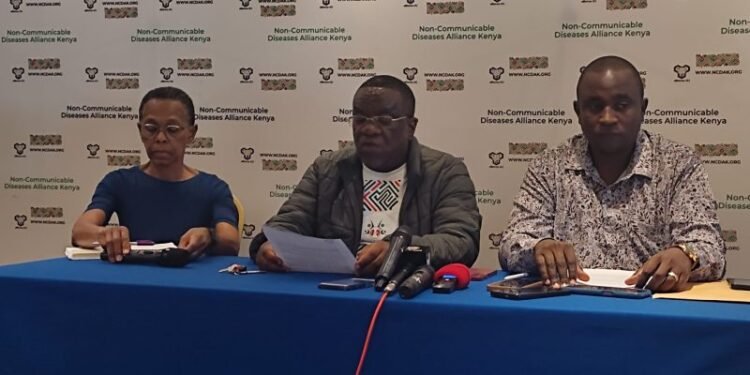

NCD Blames SHA For The Inconsistent Access to Specialized Care
NCD Blames SHA For The Inconsistent Access to Specialized Care
The Caucus of Patient-Led Organizations of Non-Communicable Diseases (NCDs) has revealed serious challenges in the rollout of the Social Health Authority (SHA).
Their recent recent survey held between October 24 and October 25, 2024, included responses from public, private, and mission hospitals in Nairobi, Kiambu, Meru, and Bomet Counties, highlighted systemic issues that have left many NCD patients struggling to access timely and affordable care.


NCD Blames SHA For The Inconsistent Access to Specialized Care
Speaking during a press briefing, NCD Vice Chair John Gikonyo, highlighted some of the Key Findings from the Survey
1. Access delays and systemic inefficiencies: Public hospitals such as Kenyatta National Hospital and Kenyatta University Referral Hospital reported frequent system delays that left patients waiting for hours to access critical services, including diagnostic imaging and specialized procedures.
In many facilities, technical failures and “system hangs” were common, exacerbating patient distress.
2. Limited SHA Coverage in Private Facilities: Private hospitals, including Nairobi Hospital and Ruai Family Hospital – Specialty Hospital, restricted SHIF coverage to civil servants in specific job groups, leaving most NCD patients ineligible.
Cancer patients, transplant recipients, and other high-risk groups are especially affected by these limitations in coverage leading to an increased reliance on out-of-pocket payments.
These conditions were previously covered under NHIF.
3. Inconsistent Access to Specialized Care: Mission hospitals like Tenwek Hospital reported no SHIF coverage, creating significant gaps in access to specialized care for rural patients.
Public hospitals such as Mama Lucy Kibaki and Mbagathi were unable to perform advanced procedures like cardiac surgeries for SHA patients, severely limiting life-saving interventions for NCD patients.


NCD Blames SHA For The Inconsistent Access to Specialized Care
General Challenges Across Facilities
• Outpatient and drug refill services: Patients are facing out-of-pocket expenses for primary healthcare services previously covered under NHIF, adding financial strain and limiting basic healthcare access for NCD patients.
• Unresolved NHIF debts and lack of clarity on SHA Benefits: Providers noted the accumulation of unpaid NHIF bills and unclear benefit structures under SHA.
These uncertainties make healthcare providers reluctant to oPer services, fearing reimbursement
delays or exclusions.
• No overseas treatment coverage: SHA has suspended coverage for overseas treatments, leaving many patients without options for specialized care not available within Kenya.
• Limited Public Awareness: Many patients lack information about SHA benefits, premium structures, and eligibility requirements, leaving them unprepared for the changes under SHA.
The Caucus of Patient-Led Organizations of NCDs chair Mr. Evans Majau noted that “The survey findings reveal critical gaps in SHA’s ability to serve Kenyan patients effectively,
especially those facing chronic and complex conditions like cancer, diabetes, and cardiovascular diseases. The SHA rollout must prioritize transparency, access to specialized care, and patient inclusion to fulfill the promise of universal health coverage in Kenya”
NCD has urged the Ministry of Health and SHA leaders to engage with patient voices and take swift, corrective action to address these issues.
The Caucus of Patient-Led Organizations of NCDs remains committed to advocating for the health needs of all Kenyans.
Through collaboration and informed action, we can work toward an equitable healthcare system that guarantees timely, quality care for every patient










